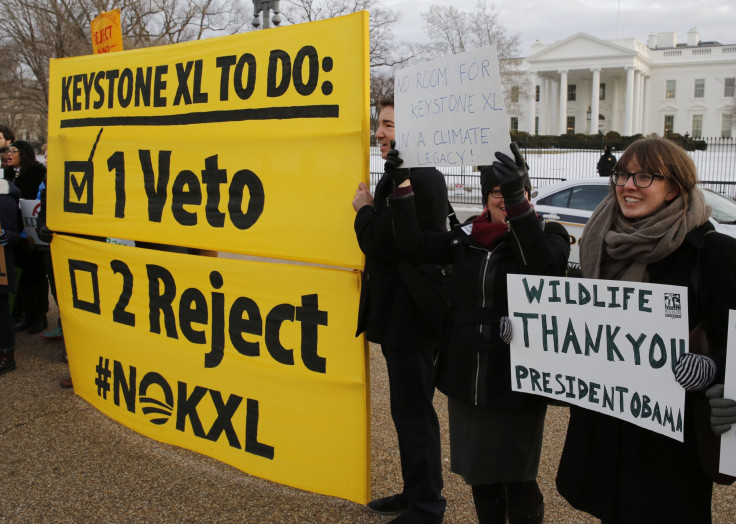US Says It Won't Pause Pipeline Review; Rejection Expected

By Valerie Volcovici
WASHINGTON (Reuters) -- The United States formally denied a request on Wednesday to pause the review of the proposed Keystone XL oil pipeline, a decision expected to lead to the project's rejection by the Obama administration.
TransCanada Corp's request to the State Department for a delay was seen by many as an attempt to postpone the decision until after President Barack Obama left office and a new president more friendly to the plan took over in 2017.
The White House declined to comment on the State Department's decision.
Secretary of State John Kerry has not given a timeline for making a recommendation on the $8 billion project.
"The secretary believes that, out of respect for that process and all the input that has gone into it, that it is the most appropriate thing to keep that process in place, to continue the review," State Department spokesman John Kirby told a news conference on Wednesday.
The State Department must issue a recommendation because the project crosses the border with Canada.
Since it was proposed seven years ago, the pipeline has been the heart of a struggle between environmentalists opposed to oil sands development and defenders of fossil fuels.
The nearly 1,200-mile (2,000-km) pipeline would carry 830,000 barrels a day of mostly Canadian oil sands crude to Nebraska en route to refineries and ports along the U.S. Gulf Coast.
Senator John Hoeven, a Republican from North Dakota who has been a major proponent of the project, believes Obama will turn down the project before the climate change summit in France in December.
“The administration basically holds this project up for seven years as a way to defeat through delay,” Hoeven said. “Now the company asks for a year delay to complete the work in Nebraska, and the Obama administration says no. That clearly shows that they intend to turn down the project.”
Even if Obama kills Keystone, Hoeven believes the project will be approved quickly on its merits if a Republican takes over the White House in 2017.
All the Democratic presidential hopefuls, including front-runner Hillary Clinton, oppose the project, while most of the Republican presidential candidates support it.
Newly elected Canadian Prime Minister Justin Trudeau, who was sworn in on Wednesday, has supported the Keystone XL pipeline, while pledging to improve Canada's climate change record.
TransCanada said it respects the State Department's decision and will continue to press for approval.
"The fundamental question remains: Do Americans want to continue to import millions of barrels of oil every day from the Middle East and Venezuela or do they want to get their oil from North Dakota and Canada through Keystone XL? We believe the answer is clear and the choice is Keystone XL," said TransCanada spokesman Mark Cooper.
TransCanada's shares closed up 1.5 percent at C$45.10 on Wednesday.
Like many politicians, analysts are also expecting the U.S. government to reject the project.
"Conventional wisdom seems to have it that the pipeline is going to get denied, but who knows whether that's right or wrong," said Steven Paget, an analyst at FirstEnergy Capital in Calgary. "At this point it is completely mired in legal and regulatory issues, and their attempts to pause the review to work out those issues have been denied."
Environmental groups quickly praised the State Department move and urged Obama to follow up by quickly rejecting the pipeline.
"Now that he’s called TransCanada for delay of game, it's time for President Obama to blow the whistle and end this pipeline once and for all," said Jamie Henn, communications director of 350.org, one of the most vocal anti-Keystone activist groups.
(Additional reporting by David Alexander and Roberta Rampton in Washington; Nia Williams and Mike Desouza in Calgary; Editing by Lisa Shumaker and Matthew Lewis)
© Copyright Thomson Reuters 2024. All rights reserved.







